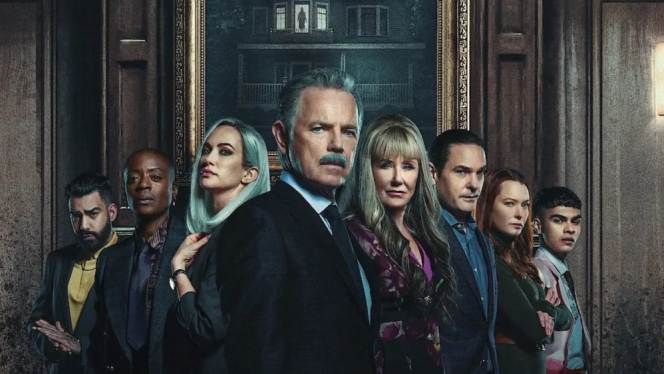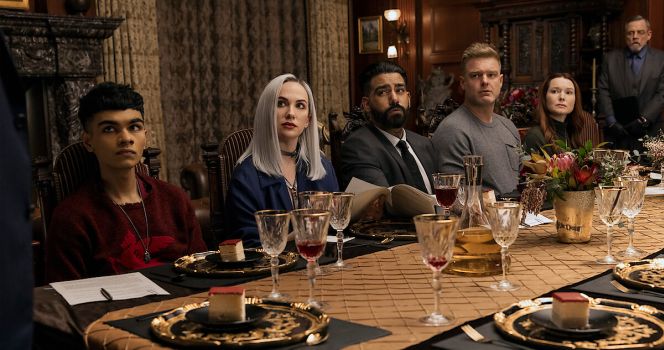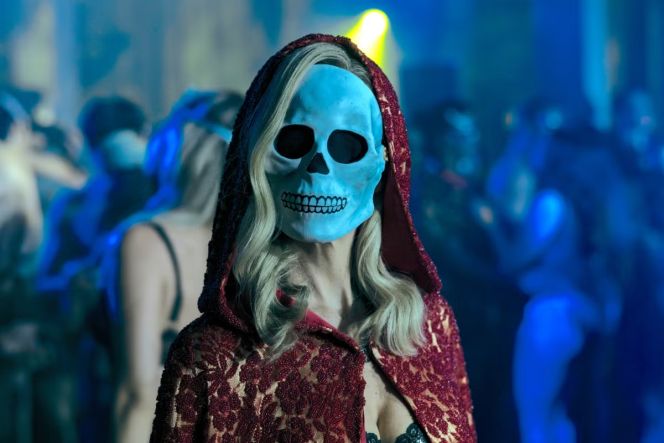SERIES REVIEW – Mike Flanagan’s latest, The Fall of the House of Usher, puts a modern spin on Edgar Allan Poe’s classic through the drama of a wealthy American family who owe their prosperity to the pharmaceutical industry. The series evokes the mystical atmosphere of Succession and The Tell-Tale Heart, where revenge, power, and betrayal set off a bloody series of events. The multiplicity of disparate sources can be overwhelming at times, but Flanagan’s directorial bravura and the performances of the recurring cast keep the story taut through eight terrifying episodes. In a month full of new additions to the horror genre but short on quality, this series stands out as a shining highlight, especially for those who are devoted fans of The Hill House Ghost or Midnight Mass. The series is available on Netflix.
On a stormy late night, Roderick Usher (Bruce Greenwood) invites a detective named C. Auguste Dupin (Carl Lumbly) into his home. The man offers to uncover the truth about his family’s guilty, violent past. Fans of Poe should immediately raise an eyebrow, as Dupin is a Poe character from works other than the one that gives this project its title, but Netflix and Flanagan’s “The Fall of the House of Usher” uses the 1839 Poe story of the title as a skeletal torso, attaching limbs based on other Poe works, including “The Masque of the Red Death,” “Murder in the Rue Morgue,” “The Black Cat,” “The Punch and the Pendulum,” “The Raven,” and many others. All of these nightmarish visions are linked to the family drama that Usher offers Dupin, giving the season a clever episodic structure, as each chapter interweaves a different Poe source with the story of the entire Usher saga.
It quickly becomes clear that nearly every branch of the Usher family has been torn apart by terrible violence. How does Usher know these gruesome details? “I know because they told me,” Usher says. Dupin asks, “Before they died?” “No, not before, after,” replies the man, in one of the many manifestations of Flanagan’s dark humor in the series. (Poe had a sense of humor of his own.)
Returning dead children
Of course, this is only partly humor, as Roderick is haunted by all the terrifying ghosts of children who have left this earthly existence, and he feels that the ghosts are finally coming for him. He is plagued by visions of terrifying ghosts, including the returning ghost of Verna (Carla Gugino), a figure who ties most of these stories together as a kind of vengeful karmic force, a demon who has come to take what is rightfully hers from a man who has profited from the pain of others.
Usher is recast as the head of a huge pharmaceutical company that he runs with his twin sister, Madeline (Mary McDonnell). Each episode features flashbacks of young Roderick (Zach Gilford), Madeline (Willa Fitzgerald) and Annabel Lee (Katie Parker), Roderick’s first wife. These tell the story of how the Ushers acquired their fortune, but in a rather long-winded manner. It is emphasized that Roderick and Madeline are cruel, selfish creatures – less so how they became so. It is far more fascinating to see how the consequences of their choices have affected Roderick’s many children, each with their own story arc based on Poe’s memorable creations, and each destined to be a female demon – in the strictest sense of the word.
Poe’s novels reimagined
Those familiar with Poe’s novels will probably know where some of the stories are headed just by looking at the episode names. When the young and fashionable Prospero Usher (Sauriyan Sapkota) decides to throw an exclusive sex-and-drugs party at one of his father’s old factories in an abbey, readers of The Masque of the Red Death will know it’s going to be a gruesome scene. But Flanagan is adept enough to alter Poe’s story slightly for a modern audience. His version of “The Tell-Tale Heart” is a modern gem, and “The Gold Bug” is reimagined as a new kind of Usher. But the themes remain the same – guilt, obsession, revenge, and a supernatural sense of justice. Roderick Usher’s children get what they deserve, not only for being the fruit of a very poisonous tree, but for making terrible choices to remain under the protection of wealth and privilege.
In the series, Prospero’s fate is only the beginning, and the story later introduces the tragedy of characters Camille L’Espanaye, Leo Usher, Victorine LeFourcade, Tamerlane Usher, and Frederick Usher. Meanwhile, we are introduced to the mysterious character of Arthur Pym, played by Mark Hamill, who works for the Ushers as a “handyman” in the series, his character being a reinterpretation of Edgar Allan Poe’s novel “The Narrative of Arthur Gordon Pym of Nantucket”.
The story arc is not without flaws
If we take a closer look at the overall narrative of The Fall of the House of Usher season, we can see that it gets bogged down in places: sometimes events are slowed down or unnecessary story elements are added. Most of the flashbacks to the young Usher and Dupin are weak, especially compared to the evil pranks we see in the fate of the Usher children. I feel that in order to cram the episodes into a full hour, Flanagan and his collaborators could have relied more heavily on the episodic structure, which highlights a single Poe work per chapter. However, each episode is entertaining and suspenseful, thanks in large part to Flanagan’s professional direction, which includes excellent use of music and dynamic editing. True, some scenes are too dark, but that’s a Netflix peculiarity these days and I’m used to it.
Although the plot is compelling and the source material is solid, the success of The Fall of the House of Usher is really down to Mike Flanagan’s choice of characters, who has assembled many familiar faces. Everyone does well here, but Greenwood and McDonnell are particularly brilliant. Greenwood, with his natural charisma, easily takes center stage, while McDonnell is given a delicious role and bites into it with full force. Lumbly’s understated style adds a seriousness to the production, while Thomas and Hamill fill the screen with humor in their mildly (but amusingly) ribald performances. The entire ensemble is brought together by the creativity of Mike Flanagan’s interplay with the works of Edgar Allan Poe. Some of this creative potential can be a bit unbridled and shapeless, but that is something Poe rarely allowed his characters to do, and it is something that can be forgiven in the case of this series.
-BadSector-
The Fall of the House of Usher
Direction - 7.5
Actors - 8.2
Story - 7.4
Music/Audio - 7.8
Ambience - 7.8
7.7
GOOD
Mike Flanagan's Netflix series The Fall of the House of Usher modernizes the works of Edgar Allan Poe through the tragedies of an American family of pharmaceutical tycoons. The series blends elements of horror and drama as it explores the family's dark past and its aftermath over eight chilling episodes. Flanagan's directorial bravura and a well-chosen cast, along with motifs from classic Poe works, combine to create a gripping, if sometimes stumbling, narrative.


















Leave a Reply